2020年英语专业八级作文范文:知识产权
保护知识产权作文范例英语

保护知识产权作文范例英语Title: Protecting Intellectual Property Rights。
In the digital age, intellectual property (IP) rights have become increasingly crucial for fostering innovation, creativity, and economic growth. However, the protection of these rights faces numerous challenges, ranging from piracy to counterfeiting. It is imperative for governments, businesses, and individuals to collaborate in safeguarding intellectual property to maintain a conducive environment for progress. This essay will delve into the importance of protecting intellectual property rights and explore various strategies to address the challenges.First and foremost, protecting intellectual property rights is essential for encouraging innovation and creativity. When creators and innovators feel confidentthat their ideas and creations will be safeguarded, they are more inclined to invest time, effort, and resourcesinto developing new technologies, products, and services.Strong IP protection fosters a culture of innovation by ensuring that creators reap the rewards of their ingenuity, thus incentivizing further innovation.Moreover, intellectual property rights play a pivotal role in driving economic growth and competitiveness. Industries heavily reliant on intellectual property, such as technology, pharmaceuticals, and entertainment, contribute significantly to national economies. Robust IP protection attracts investments, stimulates job creation, and enhances global competitiveness. Countries with strong IP regimes are more likely to attract foreign direct investment and foster vibrant ecosystems for startups and entrepreneurs.Furthermore, protecting intellectual property rights is crucial for promoting fair competition. Piracy and counterfeiting not only undermine the rights of creators and innovators but also distort market dynamics by enabling unfair competition. Companies that invest in research and development to create innovative products should not be disadvantaged by counterfeiters who illegally replicatetheir goods at a fraction of the cost. Effective IP protection ensures a level playing field where businesses compete based on the merits of their innovations ratherthan their ability to undercut prices through illicit means.In addressing the challenges to protecting intellectual property rights, a multi-faceted approach is necessary. One key aspect is strengthening legal frameworks and enforcement mechanisms. Governments need to enact and enforce laws that effectively deter and penalize IP infringement. This includes enhancing border control measures to intercept counterfeit goods, implementing stringent penalties for violators, and streamlining legal processes to expedite the resolution of IP disputes.Additionally, raising awareness about the importance of intellectual property rights is essential. Education campaigns targeted at businesses, consumers, and thegeneral public can help foster a culture of respect for intellectual property. By understanding the value of IP rights and the consequences of infringement, individualsare more likely to comply with laws and support efforts tocombat piracy and counterfeiting.Furthermore, leveraging technology can enhance the protection of intellectual property rights. Digital rights management tools, blockchain technology, and anti-counterfeiting technologies offer innovative solutions for tracking and protecting intellectual property in thedigital age. By harnessing these technologies, rights holders can better monitor and enforce their IP rights across digital platforms and supply chains.Collaboration between governments, businesses, andcivil society is also essential in addressing the global nature of intellectual property infringement. International cooperation and information sharing can help combat cross-border IP violations and disrupt criminal networks engaged in piracy and counterfeiting. Initiatives such as the World Intellectual Property Organization (WIPO) facilitate dialogue and cooperation among stakeholders to develop best practices and standards for IP protection.In conclusion, protecting intellectual property rightsis imperative for fostering innovation, driving economic growth, and promoting fair competition. While challenges such as piracy and counterfeiting persist, concerted efforts involving legal, educational, technological, and collaborative measures can strengthen IP protection and create an environment conducive to creativity, innovation, and prosperity. By safeguarding intellectual property rights, we safeguard the foundation of progress and prosperity in the digital age.。
知识产权问题的英语作文
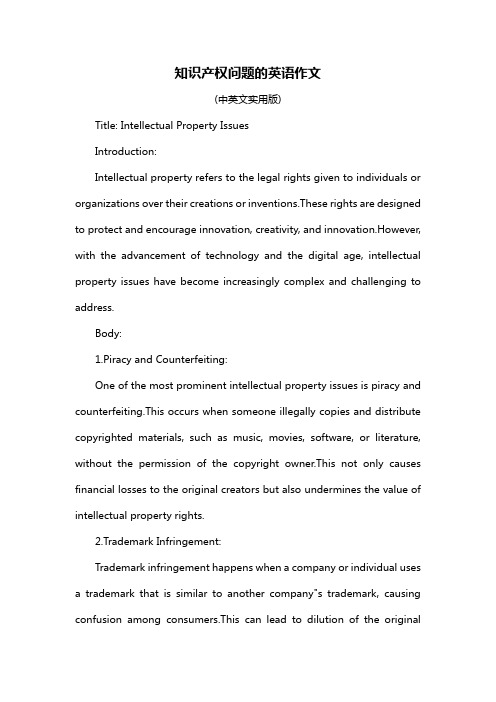
知识产权问题的英语作文(中英文实用版)Title: Intellectual Property IssuesIntroduction:Intellectual property refers to the legal rights given to individuals or organizations over their creations or inventions.These rights are designed to protect and encourage innovation, creativity, and innovation.However, with the advancement of technology and the digital age, intellectual property issues have become increasingly complex and challenging to address.Body:1.Piracy and Counterfeiting:One of the most prominent intellectual property issues is piracy and counterfeiting.This occurs when someone illegally copies and distribute copyrighted materials, such as music, movies, software, or literature, without the permission of the copyright owner.This not only causes financial losses to the original creators but also undermines the value of intellectual property rights.2.Trademark Infringement:Trademark infringement happens when a company or individual uses a trademark that is similar to another company"s trademark, causing confusion among consumers.This can lead to dilution of the originaltrademark"s value and damage the reputation of the company.It is essential for businesses to protect their trademarks and take legal action against infringers.3.Patent Infringement:Patent infringement occurs when someone uses or sells a patented invention without the permission of the patent owner.This can lead to significant financial losses for the patent holder and discourage innovation.To address this issue, companies and individuals need to conduct thorough patent searches and seek legal advice to ensure they do not infringe on existing patents.4.The Challenges of Enforcement:Enforcing intellectual property rights can be challenging, especially in the digital age.With the ease of copying and sharing files online, it has become increasingly difficult to track down and prosecute infringers.Additionally, different countries have different laws and regulations regarding intellectual property, making it challenging to enforce rights on a global scale.5.The Importance of Intellectual Property Protection:Intellectual property protection is crucial for encouraging innovation and creativity.It provides creators and inventors with the incentive to develop new ideas and products, knowing that they will have the exclusive rights to profit from their work.Without proper protection,individuals and companies may be hesitant to invest time and resources into developing new creations.Conclusion:Intellectual property issues pose significant challenges in today"s digital age.Piracy, trademark and patent infringement, and the difficulties of enforcement are all issues that need to be addressed to protect the rights of creators and encourage ernments, organizations, and individuals must work together to strengthen intellectual property laws and ensure their proper enforcement.Only through robust protection can we continue to foster a culture of innovation and creativity.。
关于知识产权作文800
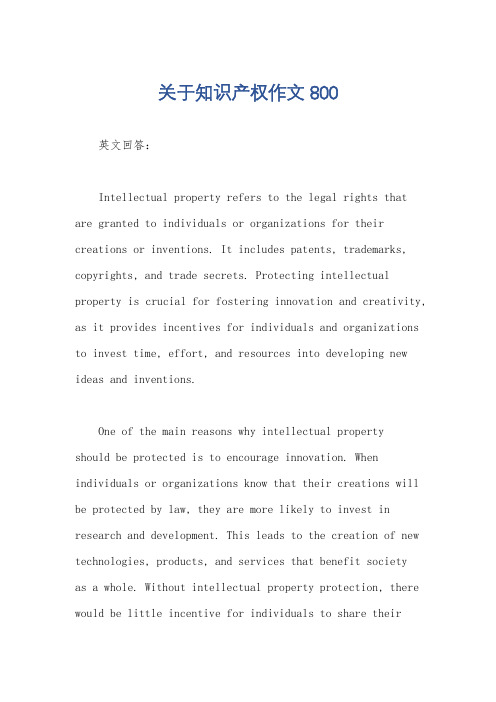
关于知识产权作文800英文回答:Intellectual property refers to the legal rights that are granted to individuals or organizations for their creations or inventions. It includes patents, trademarks, copyrights, and trade secrets. Protecting intellectual property is crucial for fostering innovation and creativity, as it provides incentives for individuals and organizations to invest time, effort, and resources into developing new ideas and inventions.One of the main reasons why intellectual propertyshould be protected is to encourage innovation. When individuals or organizations know that their creations will be protected by law, they are more likely to invest in research and development. This leads to the creation of new technologies, products, and services that benefit societyas a whole. Without intellectual property protection, there would be little incentive for individuals to share theirideas or invest in new inventions.Intellectual property protection also promotes economic growth and competitiveness. By granting exclusive rights to creators and inventors, it allows them to profit from their creations. This encourages entrepreneurship and attracts investment in industries that rely on innovation and creativity. In turn, this leads to job creation, economic development, and increased productivity.Furthermore, intellectual property protection plays a crucial role in fostering cultural diversity and preserving traditional knowledge. Copyright laws, for example, ensure that artists and authors have control over their works and can benefit financially from their creations. This allows for the preservation and promotion of diverse cultural expressions and traditions.中文回答:知识产权是指个人或组织为他们的创作或发明所获得的法律权利。
知识产权意识英语作文
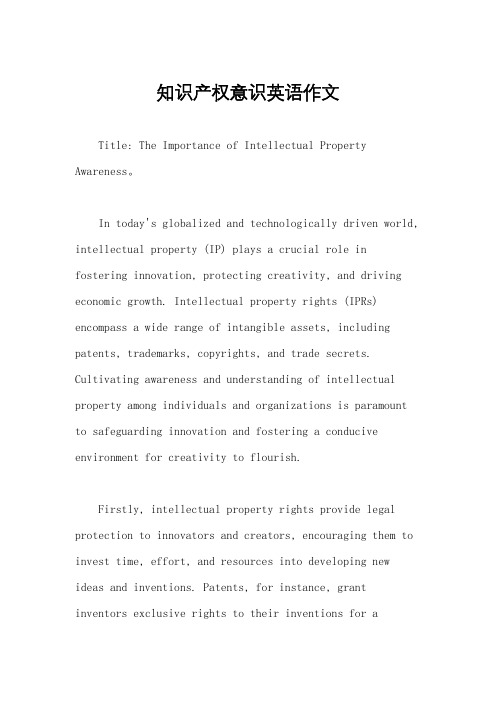
知识产权意识英语作文Title: The Importance of Intellectual Property Awareness。
In today's globalized and technologically driven world, intellectual property (IP) plays a crucial role infostering innovation, protecting creativity, and driving economic growth. Intellectual property rights (IPRs) encompass a wide range of intangible assets, including patents, trademarks, copyrights, and trade secrets. Cultivating awareness and understanding of intellectual property among individuals and organizations is paramount to safeguarding innovation and fostering a conducive environment for creativity to flourish.Firstly, intellectual property rights provide legal protection to innovators and creators, encouraging them to invest time, effort, and resources into developing new ideas and inventions. Patents, for instance, grant inventors exclusive rights to their inventions for alimited period, incentivizing them to disclose their innovations to the public in exchange for the right to exclude others from using, making, or selling their inventions without permission. This protection fosters a culture of innovation by ensuring that innovators can reap the rewards of their ingenuity, thereby fueling further research and development.Moreover, trademarks play a vital role in protecting brands and fostering consumer trust. A trademark serves as a unique identifier that distinguishes products or services of one entity from those of others, helping consumers make informed purchasing decisions. By registering trademarks, businesses can prevent others from using similar marks that could potentially confuse consumers or dilute the brand's reputation. Consequently, trademarks incentivize businesses to maintain high standards of quality and customer satisfaction, thereby promoting healthy competition and innovation in the marketplace.Furthermore, copyrights safeguard original works of authorship, such as literary, artistic, and musicalcreations. By granting creators exclusive rights to reproduce, distribute, and publicly perform their works, copyrights provide an economic incentive for authors, artists, and musicians to create and share their works with the world. Copyright protection not only rewards creators for their creativity but also encourages the dissemination of knowledge, culture, and entertainment, enriching society as a whole.In addition to patents, trademarks, and copyrights, trade secrets also form an essential component of intellectual property rights. Trade secrets encompass confidential information, such as formulas, algorithms, and processes, which provide businesses with a competitive advantage in the marketplace. Unlike patents, which require disclosure to the public, trade secrets rely on confidentiality to maintain their value. Therefore, safeguarding trade secrets through non-disclosure agreements and other measures is essential for preserving competitive advantage and fostering innovation.Despite the undeniable importance of intellectualproperty rights, challenges such as infringement, piracy, and counterfeiting persist in today's digital age. The ease of copying and disseminating digital content over the internet has exacerbated these challenges, posing significant threats to the rights and interests of creators and innovators. As such, raising awareness about the value of intellectual property and the consequences of infringement is crucial for combating piracy and promoting respect for intellectual property rights.Educational initiatives, public awareness campaigns, and enforcement efforts are essential components of a comprehensive strategy to promote intellectual property awareness and enforcement. By educating individuals, businesses, and policymakers about the benefits of intellectual property protection and the risks of infringement, society can foster a culture of respect for creativity, innovation, and entrepreneurship. Furthermore, collaboration between governments, businesses, and civil society organizations is essential for developing effective policies and enforcement mechanisms to combat intellectual property infringement and piracy.In conclusion, intellectual property awareness is vital for fostering innovation, protecting creativity, anddriving economic growth in today's knowledge-based economy. By recognizing the value of intellectual property rights and respecting the rights of creators and innovators, individuals and organizations can contribute to the creation of a more innovative, competitive, and prosperous society.。
知识产权英语作文三部
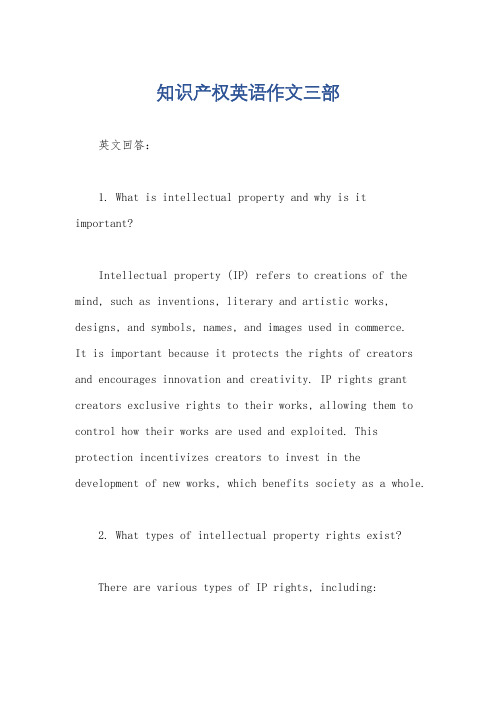
知识产权英语作文三部英文回答:1. What is intellectual property and why is it important?Intellectual property (IP) refers to creations of the mind, such as inventions, literary and artistic works, designs, and symbols, names, and images used in commerce.It is important because it protects the rights of creators and encourages innovation and creativity. IP rights grant creators exclusive rights to their works, allowing them to control how their works are used and exploited. This protection incentivizes creators to invest in the development of new works, which benefits society as a whole.2. What types of intellectual property rights exist?There are various types of IP rights, including:Patents: Protect inventions and grant exclusive rights to manufacture, use, and sell an invention for a period of time.Copyrights: Protect literary and artistic works, such as books, movies, music, and software, and grant exclusive rights to reproduce, distribute, and create derivative works.Trademarks: Distinguish goods and services in the marketplace and grant exclusive rights to use a specific mark or name.Design rights: Protect the appearance of products and grant exclusive rights to manufacture, use, and sell products with a distinctive design.Trade secrets: Confidential information that provides a business with a competitive advantage and is protected through measures to maintain its secrecy.3. How to protect your intellectual property.Protecting IP involves registering or obtaining IP rights for your creations. This can be done through patent offices, copyright offices, and trademark registries. Additionally, you should implement measures to prevent unauthorized use or infringement of your IP, such as confidentiality agreements, non-disclosure agreements, and watermarks.4. The role of intellectual property in innovation.IP plays a crucial role in fostering innovation by providing incentives for creators to invest in the development of new ideas and technologies. IP protection allows creators to reap the benefits of their creativity and avoid unauthorized exploitation, creating a more favorable environment for innovation.5. Challenges and opportunities in intellectual property.Emerging technologies and globalization present bothchallenges and opportunities in IP. For example, thedigital age has made it easier to infringe on IP rights through online piracy and unauthorized distribution. However, it also offers opportunities for new forms of IP protection, such as digital rights management and copyright collectives.中文回答:1.知识产权是什么,为什么它很重要?知识产权(IP)是指智力创作,例如发明、文学和艺术作品、设计、商业中使用的符号、名称和图像。
关于知识产权的英语作文

关于知识产权的英语作文知识产权如今越来越受到人们的关注,其热度可以从我们英语作文出现的频率中看出下面是给大家整理知识产权英语作文,供大家参阅!知识产权英语作文篇1:How to Protect Intellectual PropertyAlong with the advance of the society, more and more technologies and innovations are put forward by scientists and other people, thus we attach much importance to protectingthese immaterial things by resorting tointellectual property rights. Although these things are intangible, they are as crucial as the tangible assets we possess. Recently there appear a lot of cases which violate the intellectual property rights and affect the interests of people concerned. How should we deal with this problem?To begin with, measures should be taken to arouse public awareness so that the majority may acquire a comprehensive understanding of this special property. Next, individuals and organizations who enjoy the property must equip themselves with adequate knowledge of related laws and regulations.Once violated, it’s of great importance for them torefer to the useful tools. Last but not least, it’s the governments responsibility to perfect the system of safe guarding.As I see it, intellectual property represents the progress of society, so we should exert ourselves to protect it. And the issue of being violated will be solved ultimately if the above measures can be put into practice.知识产权英语作文篇2:The Rise of Intellectual Property ProtectionIntellectual property scarcely existed in the vocabularies of academic researchers and administrators even 15 years ago. Now it is an ever-present part of discussions on research policies and directions. This new importance of intellectual property in academia reflects a changing view on their relationships of research at universities to the surrounding society. Until recently, research at universities has been relatively isolated from demands of economic utility, and education of graduate students has emphasized a career in academic research as the final goal.Now almost all research universities in the United States have technology licensing operations. The number of U.S. patents granted to American universities in a year rose from about 300 in 1980 to almost 2000 in 1995. The directeconomic impact of technology licensing on the universities themselves has been relatively small. In contrast, the impact of university technology transfer on the local and national economies has been substantial, and leads to the conclusion that the Licensing Act () is one of the most successful pieces of economic development in recent history. It has been estimated that more than 200000 jobs have been created in the United States in product development and manufacturing of products from university licenses, with the number increasing fairly rapidly as the licenses mature.Intellectual property terms have become vitally important. The company wants to be assured that it can use the results of the research-and that these results will not be available to their competitors. But most universities insist that transfer of research results is pivotal to their identity and mission and will not agree to keep the project results secret. The key to resolving this dilemma is to grant patents: the university will publish the results, but will first agree to file patents that will protect the company's privilege in the commercial market place.知识产权英语作文篇3:知识产权在中国The value of intellectual property has become a rising issue within China, asit seeks to further integrate itself into the world economy. The effects of producing illegal, copyrighted goods are still being studied. One effect is that artists may no longer produce top quality products if they know that many will only copy their work. This can be seen with the lawsuits against illegal downloading in the United States. These lawsuits and the threat of lawsuits by the music and movie industries are being made to keep people from breaking the law. With the level of international communication and transportation that exists today, copyright problems have become global. Yet, in the future, the relationship between industries and government will be more organized, and this may deter many copiers from breaking the rules. The effect on the industries that are being copied has also been substantial. Several industries have chosen to view this problem as a wake-up call. They are starting to rethink the emphasis placed only on profits. Many companies are beginning to offer more customer-driven prices and choices. For example, in some foreign countries, you can purchase songs on the Internet instead of buying a music CD. The prices of software and other materials are beginning to lower. China, as it joins the World Trade Organization (WTO), will no doubt begin to enact morepenalties against copyright infringers as was seen in the United States. This will strengthen Chinese brands as they become more global.随着中国一步步地融入世界经济之中,在中国,常识产权的价值问题开始逐渐升温。
知识产权介绍的英文作文
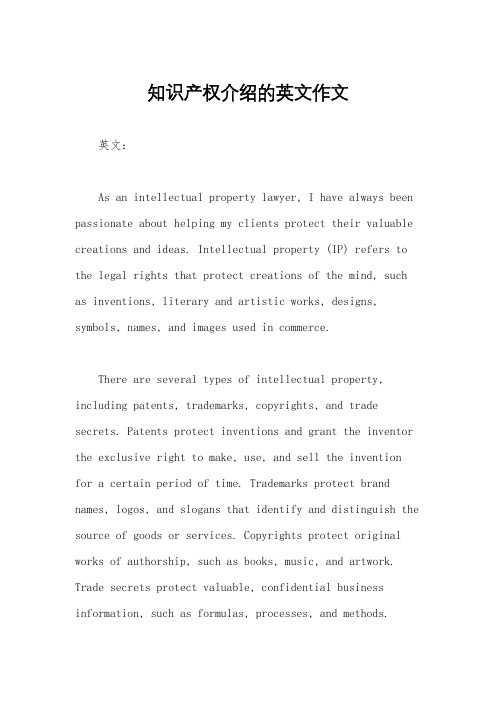
知识产权介绍的英文作文英文:As an intellectual property lawyer, I have always been passionate about helping my clients protect their valuable creations and ideas. Intellectual property (IP) refers to the legal rights that protect creations of the mind, such as inventions, literary and artistic works, designs, symbols, names, and images used in commerce.There are several types of intellectual property, including patents, trademarks, copyrights, and trade secrets. Patents protect inventions and grant the inventor the exclusive right to make, use, and sell the inventionfor a certain period of time. Trademarks protect brand names, logos, and slogans that identify and distinguish the source of goods or services. Copyrights protect original works of authorship, such as books, music, and artwork. Trade secrets protect valuable, confidential business information, such as formulas, processes, and methods.Intellectual property is important because it encourages innovation and creativity by providing creators and inventors with the incentive to develop and share their ideas without the fear of someone else stealing or copying them. For example, a pharmaceutical company that invests millions of dollars in research and development to create a new drug would not be willing to do so without the protection of a patent that allows them to recoup their investment by being the exclusive seller of the drug for a certain period of time.In addition to protecting individual creators and inventors, intellectual property also benefits society as a whole by promoting economic growth and development. For example, the fashion industry relies on trademarks to protect their brand names and logos, which in turn encourages consumers to purchase products from recognized and trusted brands.In my practice, I have helped clients navigate the complex process of obtaining and enforcing theirintellectual property rights. This often involves conducting thorough searches to ensure that the proposed creation or invention does not infringe on existing IP rights, preparing and filing applications with the appropriate government agencies, and enforcing those rights against potential infringers.I have also helped clients draft and negotiatelicensing agreements, which allow them to monetize their intellectual property by granting others the right to use it in exchange for a fee or royalty. These agreements are crucial in industries such as technology and entertainment, where companies often collaborate and share their intellectual property to create innovative products and services.Overall, intellectual property is a crucial aspect of modern business and innovation, and I am proud to be able to help my clients navigate the complex legal landscape to protect their valuable creations and ideas.中文:作为一名知识产权律师,我一直热衷于帮助我的客户保护他们宝贵的创作和想法。
关于知识产权的作文英语
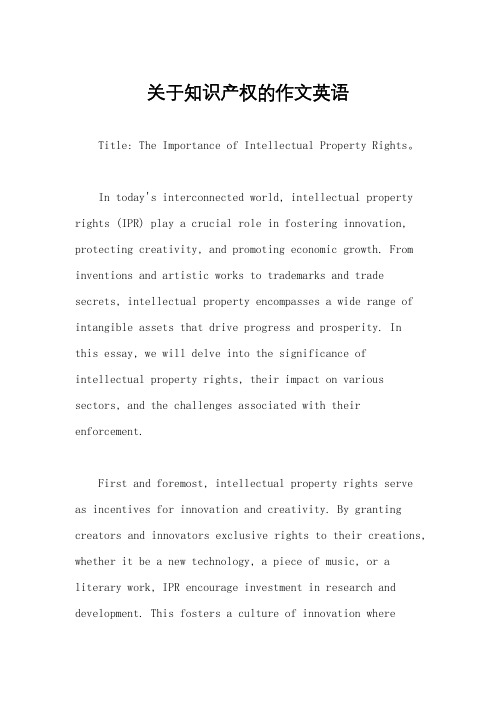
关于知识产权的作文英语Title: The Importance of Intellectual Property Rights。
In today's interconnected world, intellectual property rights (IPR) play a crucial role in fostering innovation, protecting creativity, and promoting economic growth. From inventions and artistic works to trademarks and trade secrets, intellectual property encompasses a wide range of intangible assets that drive progress and prosperity. Inthis essay, we will delve into the significance of intellectual property rights, their impact on various sectors, and the challenges associated with their enforcement.First and foremost, intellectual property rights serve as incentives for innovation and creativity. By granting creators and innovators exclusive rights to their creations, whether it be a new technology, a piece of music, or a literary work, IPR encourage investment in research and development. This fosters a culture of innovation whereindividuals and businesses are motivated to continuously improve existing products and services or develop entirely new ones. Without the protection afforded by intellectual property rights, there would be little incentive for inventors and creators to invest time, resources, and expertise into developing new ideas.Moreover, intellectual property rights are essential for fostering economic growth and competitiveness. In today's knowledge-based economy, where ideas and information are often more valuable than physical assets, protecting intellectual property is paramount for businesses to maintain a competitive edge. Companies rely on patents, copyrights, trademarks, and other forms of intellectual property protection to safeguard their innovations, brands, and creative works from unauthorized use or exploitation by competitors. This not only ensures fair competition but also incentivizes investment in industries that rely heavily on intellectual capital, such as technology, pharmaceuticals, and entertainment.Furthermore, intellectual property rights play acrucial role in promoting cultural diversity and preserving heritage. Copyright laws, for example, protect the rights of authors, musicians, filmmakers, and other creators to control the use and distribution of their works. This not only allows artists to earn a living from their creations but also ensures that diverse voices and perspectives are represented in the cultural landscape. Similarly, trademarks help preserve the reputation and authenticity of products associated with specific regions or cultures, contributing to the preservation of cultural heritage.Despite their many benefits, intellectual property rights also face challenges, particularly in the digital age. The ease of copying and distributing digital content has led to rampant piracy and infringement, undermining the ability of creators and innovators to monetize their works. Online platforms and file-sharing networks have made it increasingly difficult to enforce intellectual property rights, leading to revenue losses for rights holders and stifling innovation in some sectors. Moreover, the global nature of intellectual property theft poses challenges for enforcement efforts, as laws and regulations vary from onejurisdiction to another, making it easier for infringers to evade prosecution.To address these challenges, governments, businesses, and international organizations must work together to strengthen intellectual property protection and enforcement mechanisms. This includes implementing robust legal frameworks, increasing awareness of intellectual property rights among the public, and enhancing cooperation between law enforcement agencies at the national and international levels. Additionally, technological solutions such as digital rights management tools and blockchain-based authentication systems can help mitigate the risks of piracy and counterfeiting in the digital domain.In conclusion, intellectual property rights play avital role in incentivizing innovation, fostering economic growth, and preserving cultural heritage. By protecting the rights of creators and innovators, intellectual property laws contribute to the advancement of society as a whole. However, in an increasingly digital and interconnected world, ensuring effective protection and enforcement ofintellectual property rights poses significant challenges. Addressing these challenges requires a concerted effort from governments, businesses, and other stakeholders to safeguard the fruits of human creativity and ingenuity for generations to come.。
知识产权英语作文三部
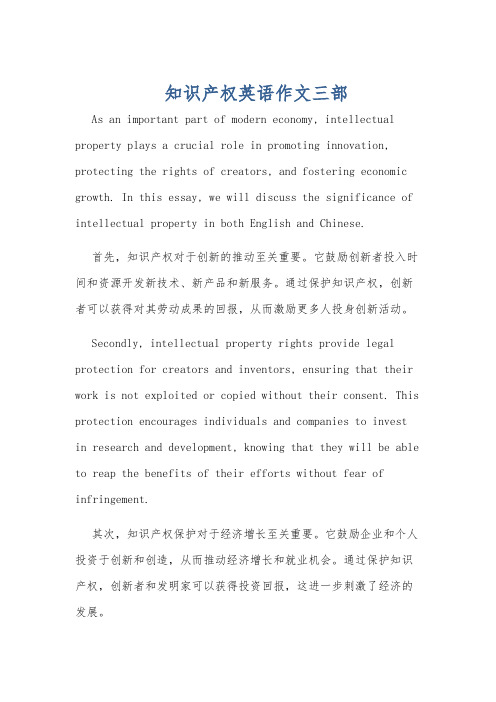
知识产权英语作文三部As an important part of modern economy, intellectual property plays a crucial role in promoting innovation, protecting the rights of creators, and fostering economic growth. In this essay, we will discuss the significance of intellectual property in both English and Chinese.首先,知识产权对于创新的推动至关重要。
它鼓励创新者投入时间和资源开发新技术、新产品和新服务。
通过保护知识产权,创新者可以获得对其劳动成果的回报,从而激励更多人投身创新活动。
Secondly, intellectual property rights provide legal protection for creators and inventors, ensuring that their work is not exploited or copied without their consent. This protection encourages individuals and companies to investin research and development, knowing that they will be able to reap the benefits of their efforts without fear of infringement.其次,知识产权保护对于经济增长至关重要。
它鼓励企业和个人投资于创新和创造,从而推动经济增长和就业机会。
通过保护知识产权,创新者和发明家可以获得投资回报,这进一步刺激了经济的发展。
知识产权方面的英语作文

知识产权方面的英语作文In today's globalized world, intellectual property rights have become increasingly important. From patents and trademarks to copyrights and trade secrets, protecting intellectual property is crucial for businesses and individuals alike.The concept of intellectual property rights is not a new one, but with the rapid pace of technological advancements, the need to protect these rights has never been greater.In the digital age, the issue of intellectual property rights is particularly complex. With the ease of sharing and replicating digital content, it has become increasingly challenging to prevent unauthorized use and distribution of intellectual property.The enforcement of intellectual property rights varies from country to country, which can create challenges formultinational companies operating in different jurisdictions.Despite the challenges, intellectual property rights are essential for fostering innovation and creativity. By providing legal protection for original works and inventions, intellectual property rights incentivize individuals and businesses to invest in research and development.Infringement of intellectual property rights can have serious consequences, including legal action and financial penalties. Therefore, it is important for individuals and businesses to be aware of the laws and regulations governing intellectual property in their respective jurisdictions.In conclusion, intellectual property rights play a crucial role in the modern economy. As technology continues to advance, it is important for individuals and businesses to understand and protect their intellectual property rights.。
英语作文我国知识产权机构

英语作文我国知识产权机构China's Intellectual Property Rights Agencies: Safeguarding Creativity and Innovation.In the fast-paced global economy, intellectual property rights (IPRs) have become a crucial aspect of protecting creativity, innovation, and knowledge. China, as a leading economy and a hub of innovation, has recognized the importance of IPRs and established a robust framework to safeguard them. This article delves into the structure, functions, and significance of China's intellectualproperty rights agencies.Structure of China's IPR Agencies.China's intellectual property rights system is governed by several key agencies that work in tandem to ensure the protection and enforcement of IPRs. The most prominent among them is the State Intellectual Property Office (SIPO), which is responsible for the registration, examination, andprotection of patents, trademarks, and other forms of intellectual property.The SIPO is structured into various departments, each specialized in handling different aspects of IPR management. For instance, the Patent Examination Cooperation Center handles patent applications, while the Trademark Review and Adjudication Board deals with trademark disputes. These departments work closely with provincial and municipal IP offices to ensure a comprehensive and efficient IPprotection system across the country.Functions of IPR Agencies.The primary function of China's IPR agencies is to promote the creation and utilization of intellectual property by providing a secure legal environment. This involves registering patents, trademarks, and other formsof intellectual property, ensuring their validity, and protecting them from infringement.The agencies also play a crucial role in enforcing IPRlaws. They conduct regular inspections and raids toidentify and penalize those who infringe upon intellectual property rights. Additionally, they provide support and assistance to IP owners in litigating cases of infringement, ensuring that their rights are upheld.Moreover, the IPR agencies in China actively promote IP awareness and education among the general public and businesses. They organize workshops, seminars, and training programs to educate people on the importance of IPRs and how to protect them effectively.Significance of IPR Agencies in China.The significance of China's IPR agencies cannot be overstated. Firstly, they play a pivotal role in encouraging creativity and innovation. By providing asecure legal framework for the protection of intellectual property, these agencies ensure that creators and inventors are rewarded for their efforts and are motivated tocontinue innovating.Secondly, IPR agencies contribute significantly to China's economic growth. The country's thriving technology, manufacturing, and creative industries rely heavily on intellectual property. By safeguarding IPRs, these agencies enable these industries to flourish and compete globally.Moreover, IPR agencies play a key role in international trade and cooperation. China, as a major trading partner, must adhere to international IPR standards to ensure smooth trade relations. Its IPR agencies work closely with international organizations and other countries' IP offices to promote harmonization of IP laws and practices.Conclusion.In conclusion, China's intellectual property rights agencies play a crucial role in safeguarding creativity, innovation, and knowledge. By providing a secure legal framework for the protection and enforcement of IPRs, they encourage creativity and innovation, contribute to economic growth, and facilitate international trade and cooperation. As China continues to emerge as a global leader intechnology and innovation, its IPR agencies will play an increasingly important role in safeguarding the rights of creators and inventors, and driving the country's economic prosperity.。
英语作文我国知识产权机构
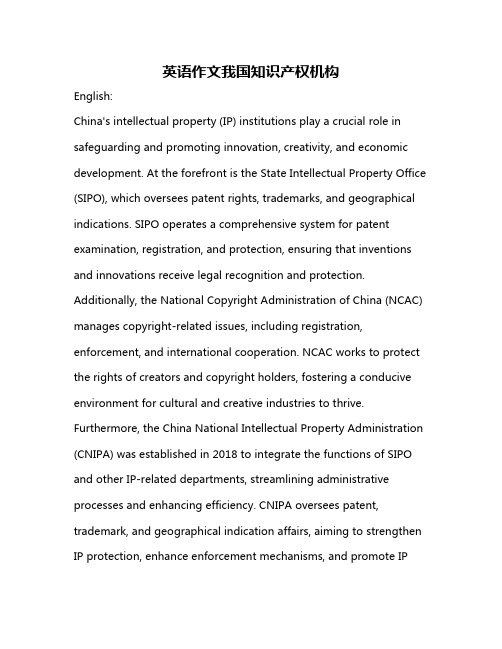
英语作文我国知识产权机构English:China's intellectual property (IP) institutions play a crucial role in safeguarding and promoting innovation, creativity, and economic development. At the forefront is the State Intellectual Property Office (SIPO), which oversees patent rights, trademarks, and geographical indications. SIPO operates a comprehensive system for patent examination, registration, and protection, ensuring that inventions and innovations receive legal recognition and protection. Additionally, the National Copyright Administration of China (NCAC) manages copyright-related issues, including registration, enforcement, and international cooperation. NCAC works to protect the rights of creators and copyright holders, fostering a conducive environment for cultural and creative industries to thrive. Furthermore, the China National Intellectual Property Administration (CNIPA) was established in 2018 to integrate the functions of SIPO and other IP-related departments, streamlining administrative processes and enhancing efficiency. CNIPA oversees patent, trademark, and geographical indication affairs, aiming to strengthen IP protection, enhance enforcement mechanisms, and promote IPutilization and innovation. These institutions collaborate with law enforcement agencies, judicial bodies, industry associations, and international organizations to combat infringement, improve IP awareness, and facilitate global cooperation in IP protection and enforcement.Translated content:中国的知识产权机构在维护和促进创新、创造力和经济发展方面发挥着至关重要的作用。
知识产权交易英语作文

知识产权交易英语作文Intellectual Property Trading。
In recent years, intellectual property trading has become an increasingly important part of the global economy. Intellectual property refers to creations of the mind, such as inventions, literary and artistic works, and symbols, names, and images used in commerce. Intellectual property rights protect these creations, and intellectual property trading involves buying, selling, licensing, or otherwise transferring these rights.Intellectual property trading can take many forms. For example, a company may sell the rights to a patent to another company in exchange for a lump sum payment or ongoing royalties. Alternatively, a company may license its trademark to another company for use in a particular market or product category. In some cases, intellectual property rights may be bundled together and sold as a package, such as when a film studio sells the rights to a movie franchise.There are many reasons why companies engage in intellectual property trading. For one, it can be a way to monetize intellectual property assets that are notcurrently being used to their full potential. Additionally, it can be a way to generate revenue without having toinvest in research and development or marketing. Finally,it can be a way to mitigate risk by diversifying a company's intellectual property portfolio.However, intellectual property trading also presents challenges. For one, it can be difficult to determine the value of intellectual property rights, particularly when they are not currently being used. Additionally, there is a risk that the rights being sold or licensed may infringe on the intellectual property rights of others. Finally, there is a risk that the market for a particular type of intellectual property may decline, reducing the value of the investment.Despite these challenges, intellectual property trading is likely to continue to play an important role in theglobal economy. As companies continue to invest in research and development and create new intellectual property assets, there will be a growing demand for ways to monetize and protect these assets. Additionally, as the global economy becomes more interconnected, intellectual property trading will become increasingly important as a way to facilitate cross-border transactions.In conclusion, intellectual property trading is a complex and rapidly evolving field that presents both opportunities and challenges for companies and investors. While it is not without risk, it can be a powerful tool for monetizing and protecting intellectual property assets, and is likely to remain an important part of the global economy in the years to come.。
保护知识产权英语作文
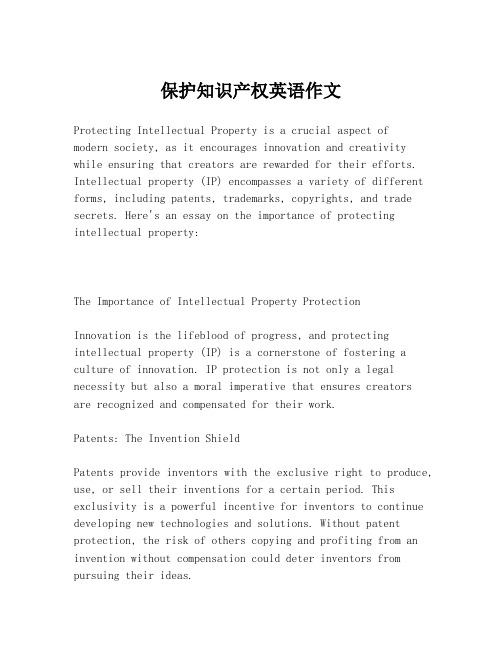
保护知识产权英语作文Protecting Intellectual Property is a crucial aspect of modern society, as it encourages innovation and creativity while ensuring that creators are rewarded for their efforts. Intellectual property (IP) encompasses a variety of different forms, including patents, trademarks, copyrights, and trade secrets. Here's an essay on the importance of protecting intellectual property:The Importance of Intellectual Property ProtectionInnovation is the lifeblood of progress, and protecting intellectual property (IP) is a cornerstone of fostering a culture of innovation. IP protection is not only a legal necessity but also a moral imperative that ensures creatorsare recognized and compensated for their work.Patents: The Invention ShieldPatents provide inventors with the exclusive right to produce, use, or sell their inventions for a certain period. This exclusivity is a powerful incentive for inventors to continue developing new technologies and solutions. Without patent protection, the risk of others copying and profiting from an invention without compensation could deter inventors from pursuing their ideas.Trademarks: Brand Identity and TrustTrademarks are symbols, names, or logos that identify and distinguish the goods or services of one business from another. They are crucial for building brand recognition and consumer trust. Protecting trademarks ensures that consumers are not misled by counterfeit goods and that businesses arenot unfairly disadvantaged by competitors infringing on their brand identity.Copyrights: The Creative SparkCopyrights protect original works of authorship, such as literary, musical, and artistic creations. They allowcreators to control how their work is used, reproduced, and distributed. This protection is essential for artists and writers to earn a living from their creations and to have the freedom to express their ideas without the fear of theft.Trade Secrets: Competitive EdgeTrade secrets refer to confidential business information that gives a company a competitive edge. This can include formulas, processes, techniques, or strategies that are not generally known or easily discovered. Protecting trade secrets is vital for maintaining a company's competitive advantage and for encouraging the development of new and innovative business practices.The Global ImpactThe protection of intellectual property is not confined to national borders. With the rise of globalization, international agreements and treaties have been established to ensure that IP rights are respected across countries. This global cooperation is essential for fostering international trade and collaboration, as it provides a level playing field for businesses and creators worldwide.ConclusionIn conclusion, protecting intellectual property is essential for encouraging creativity, innovation, and economic growth. It is a complex but necessary task that requires the cooperation of governments, businesses, and individuals. By safeguarding the fruits of our collective imagination and hard work, we can ensure a vibrant and prosperous future for all.This essay highlights the different types of intellectual property and their significance in the global economy. It underscores the importance of a robust legal framework to protect these rights and the benefits that such protection brings to society as a whole.。
知识产权交易英语作文
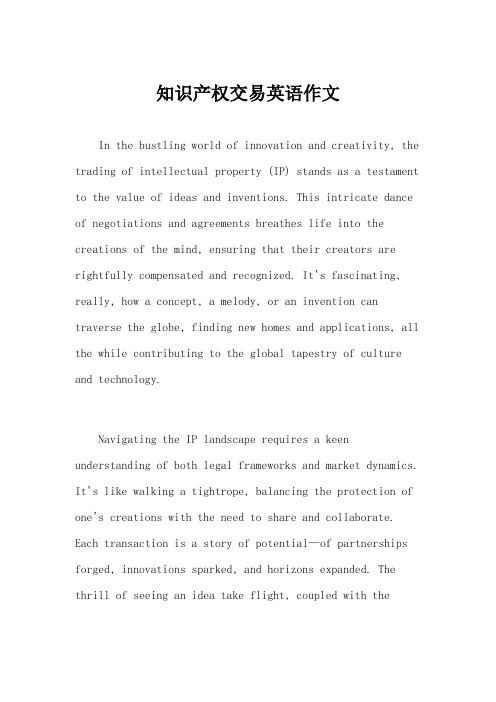
知识产权交易英语作文In the bustling world of innovation and creativity, the trading of intellectual property (IP) stands as a testament to the value of ideas and inventions. This intricate dance of negotiations and agreements breathes life into the creations of the mind, ensuring that their creators are rightfully compensated and recognized. It's fascinating, really, how a concept, a melody, or an invention can traverse the globe, finding new homes and applications, all the while contributing to the global tapestry of culture and technology.Navigating the IP landscape requires a keen understanding of both legal frameworks and market dynamics. It's like walking a tightrope, balancing the protection of one's creations with the need to share and collaborate. Each transaction is a story of potential—of partnerships forged, innovations sparked, and horizons expanded. The thrill of seeing an idea take flight, coupled with thesatisfaction of a deal well done, is unparalleled.As we continue to push the boundaries of what's possible, the trading of intellectual property serves as a beacon, guiding us towards a future where creativity and innovation are celebrated and cherished. It's a reminder that in the realm of ideas, the only limit is our imagination.。
知识产权和保护作文

知识产权和保护作文Intellectual property rights are essential to promoting innovation and creativity in society. It is a system that protects the creations of individuals or companies, such as inventions, designs, trademarks, and literary works, from being used or copied by others without permission. 知识产权对于在社会中促进创新和创造力至关重要。
它是一种保护个人或公司的创作,例如发明、设计、商标和文学作品,不被他人未经许可使用或复制的系统。
One of the main benefits of intellectual property rights is that they provide creators with the incentive to invest time and resources into developing new ideas and products. Without the protection of intellectual property rights, creators may be less inclined to invest in innovation, as there would be no guarantee that they would be able to profit from their work.知识产权的一个主要好处是它为创作者提供了投入时间和资源来开发新想法和产品的动力。
没有知识产权的保护,创作者可能不太愿意投资于创新,因为没有保证他们能从自己的工作中获利。
关于知识产权的英语作文
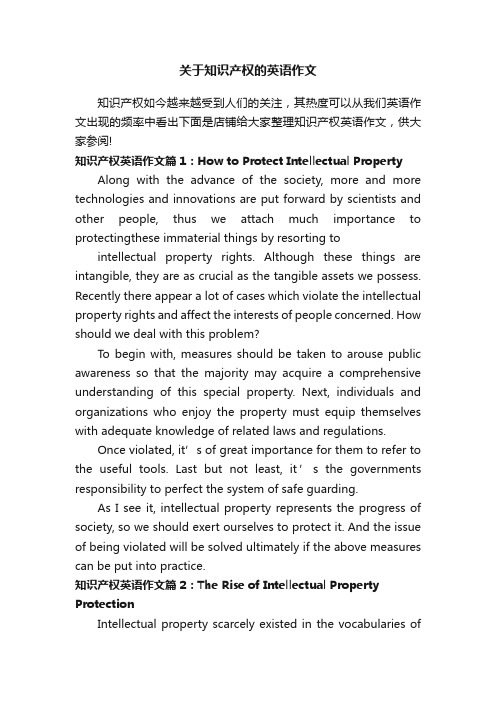
关于知识产权的英语作文知识产权如今越来越受到人们的关注,其热度可以从我们英语作文出现的频率中看出下面是店铺给大家整理知识产权英语作文,供大家参阅!知识产权英语作文篇1:How to Protect Intellectual Property Along with the advance of the society, more and more technologies and innovations are put forward by scientists and other people, thus we attach much importance to protectingthese immaterial things by resorting tointellectual property rights. Although these things are intangible, they are as crucial as the tangible assets we possess. Recently there appear a lot of cases which violate the intellectual property rights and affect the interests of people concerned. How should we deal with this problem?To begin with, measures should be taken to arouse public awareness so that the majority may acquire a comprehensive understanding of this special property. Next, individuals and organizations who enjoy the property must equip themselves with adequate knowledge of related laws and regulations.Once violated, it’s of great importance for them to refer to the useful tools. Last but not least, it’s the governments responsibility to perfect the system of safe guarding.As I see it, intellectual property represents the progress of society, so we should exert ourselves to protect it. And the issue of being violated will be solved ultimately if the above measures can be put into practice.知识产权英语作文篇2:The Rise of Intellectual Property ProtectionIntellectual property scarcely existed in the vocabularies ofacademic researchers and administrators even 15 years ago. Now it is an ever-present part of discussions on research policies and directions. This new importance of intellectual property in academia reflects a changing view on their relationships of research at universities to the surrounding society. Until recently, research at universities has been relatively isolated from demands of economic utility, and education of graduate students has emphasized a career in academic research as the final goal.Now almost all research universities in the United States have technology licensing operations. The number of U.S. patents granted to American universities in a year rose from about 300 in 1980 to almost 2000 in 1995. The direct economic impact of technology licensing on the universities themselves has been relatively small. In contrast, the impact of university technology transfer on the local and national economies has been substantial, and leads to the conclusion that the Licensing Act () is one of the most successful pieces of economic development in recent history. It has been estimated that more than 200000 jobs have been created in the United States in product development and manufacturing of products from university licenses, with the number increasing fairly rapidly as the licenses mature.Intellectual property terms have become vitally important. The company wants to be assured that it can use the results of the research-and that these results will not be available to their competitors. But most universities insist that transfer of research results is pivotal to their identity and mission and will not agree to keep the project results secret. The key to resolving this dilemma is to grant patents: the university will publish the results, but will first agree to file patents that will protect the company's privilege in the commercial market place.知识产权英语作文篇3:知识产权在中国The value of intellectual property has become a rising issue within China, as it seeks to further integrate itself into the world economy. The effects of producing illegal, copyrighted goods are still being studied. One effect is that artists may no longer produce top quality products if they know that many will only copy their work. This can be seen with the lawsuits against illegal downloading in the United States. These lawsuits and the threat of lawsuits by the music and movie industries are being made to keep people from breaking the law. With the level of international communication and transportation that exists today, copyright problems have become global. Yet, in the future, the relationship between industries and government will be more organized, and this may deter many copiers from breaking the rules. The effect on the industries that are being copied has also been substantial. Several industries have chosen to view this problem as a wake-up call. They are starting to rethink the emphasis placed only on profits. Many companies are beginning to offer more customer-driven prices and choices. For example, in some foreign countries, you can purchase songs on the Internet instead of buying a music CD. The prices of software and other materials are beginning to lower. China, as it joins the World Trade Organization (WTO), will no doubt begin to enact more penalties against copyright infringers as was seen in the United States. This will strengthen Chinese brands as they become more global.随着中国一步步地融入世界经济之中,在中国,常识产权的价值问题开始逐渐升温。
英语考试作文-专八作文范文:知识产权课程是否能杜绝抄袭
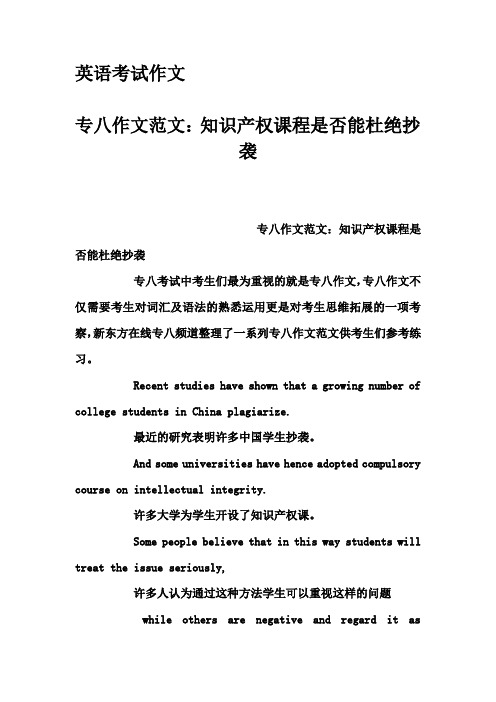
英语考试作文专八作文范文:知识产权课程是否能杜绝抄袭专八作文范文:知识产权课程是否能杜绝抄袭专八考试中考生们最为重视的就是专八作文,专八作文不仅需要考生对词汇及语法的熟悉运用更是对考生思维拓展的一项考察,新东方在线专八频道整理了一系列专八作文范文供考生们参考练习。
Recent studies have shown that a growing number of college students in China plagiarize.最近的研究表明许多中国学生抄袭。
And some universities have hence adopted compulsory course on intellectual integrity.许多大学为学生开设了知识产权课。
Some people believe that in this way students will treat the issue seriously,许多人认为通过这种方法学生可以重视这样的问题while others are negative and regard it asformalistic.但是还有人认为这样做纯粹是一种形式主义的做法。
As far as I am concerned,我认为the intellectual integrity course will to some extent help change the situation.知识产权在一定程度上将改变这一情况。
On the one hand,一方面intellectual integrity course emphasizes the education of academic morality知识产权重视的是学术的道德教育and helps students to develop a good academic attitude.并帮助学生培养正确的学术态度。
- 1、下载文档前请自行甄别文档内容的完整性,平台不提供额外的编辑、内容补充、找答案等附加服务。
- 2、"仅部分预览"的文档,不可在线预览部分如存在完整性等问题,可反馈申请退款(可完整预览的文档不适用该条件!)。
- 3、如文档侵犯您的权益,请联系客服反馈,我们会尽快为您处理(人工客服工作时间:9:00-18:30)。
2017年英语专业八级作文范文:知识产权
保护的崛起
知识产权保护的崛起
The Rise of Intellectual Property Protection
Intellectual property scarcely existed in the vocabularies of academic researchers and administrators even 15 years ago. Now it is an ever-present part of discussions on research policies and directions. This new importance of intellectual property in academia reflects a changing view on their relationships of research at universities to the surrounding society. Until recently, research at universities has been relatively isolated from demands of economic utility, and education of graduate students has emphasized a career in academic research as the final goal.
Now almost all research universities in the United States have technology licensing operations. The number of U.S. patents granted to American universities in a year rose from about 300 in 1980 to almost 2000 in 1995. The direct economic impact of technology licensing on the universities themselves has been
relatively small. In contrast, the impact of university technology transfer on the local and national economies has been substantial, and leads to the conclusion that the Licensing Act () is one of the most successful pieces of economic development in recent history. It has been estimated that more than 200000 jobs have been created in the United States in product development and manufacturing of products from university licenses, with the number increasing fairly rapidly as the licenses mature.
Intellectual property terms have become vitally important. The company wants to be assured that it can use the results of the research-and that these results will not be available to their competitors. But most universities insist that transfer of research results is pivotal to their identity and mission and will not agree to keep the project results secret. The key to resolving this dilemma is to grant patents: the university will publish the results, but will first agree to file patents that will protect the company's privilege in the commercial market place.
点击免费试听>>>
点击免费试听>>>
【2017年英语专业八级作文范文:知识产权保护的崛起】。
